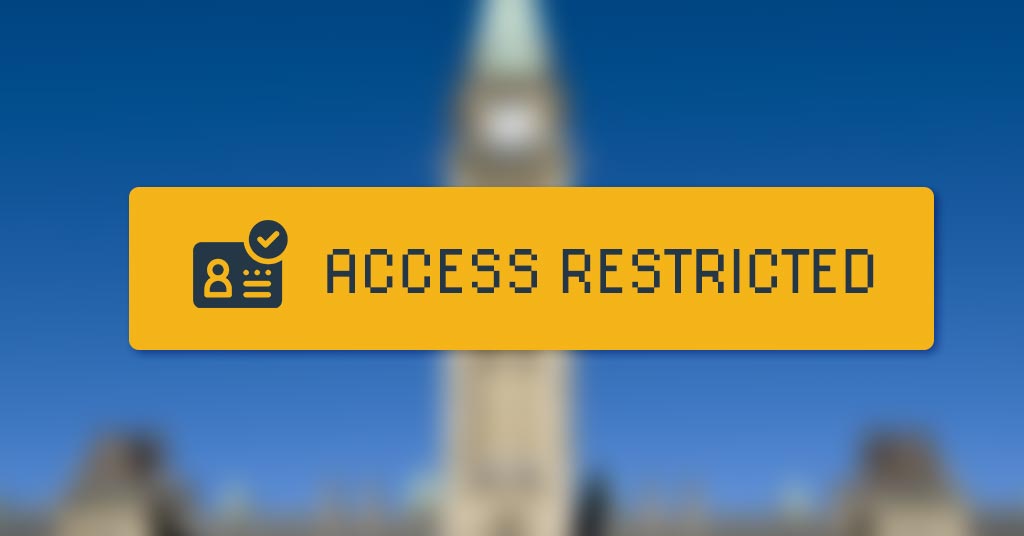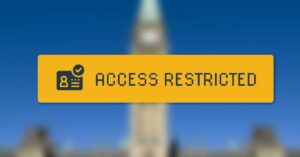
Canadian MPs Want to Verify People Watching Internet Porn. They Admit They’re Not Sure How Their Law Would Actually Work.
Legal experts say a poorly-drafted bill is likely unconstitutional and would also block access to websites unrelated to pornography
Members of Parliament across all parties put partisanship aside before the holidays and voted for legislation targeting online pornography that legal experts warn is likely unconstitutional and could impact websites that have nothing to do with pornography.
Last week, a multipartisan coalition of 174 MPs, including the Conservatives, Bloc Québécois, NDP, Greens and 15 Liberal MPs, voted at second reading for Bill S-210, the so-called “Protecting Young Persons from Exposure to Pornography Act,” despite warnings from experts that the bill raises major privacy concerns, opens the door to unprecedented website blocking and undermines the safety of sex workers.
133 Liberal MPs, including cabinet, voted against the bill. Heritage Minister Pascale St-Onge later called Bill S-210 “fundamentally flawed.”
Bill S-210, introduced by Justin Trudeau-appointed Senator Julie Miville-Dechêne and sponsored by Pierre Poilievre’s Conservatives in the House of Commons, seeks to “deter” websites from displaying “sexually explicit material” to young people by requiring all website visitors to verify their identity.
Websites that do not comply with the law could face massive fines while Internet service providers could be subject to court orders forcing them to block access to those websites.
University of Ottawa law professor and Canada Research Chair of Internet law Michael Geist, who calls Bill S-210 “the most dangerous Canadian Internet bill you’ve never heard of,” says that while there are real concerns about underage access to inappropriate content, this legislation is poorly-drafted and dangerously broad.
“The bill is not limited to sites that are primarily about access to sexually explicit material but rather covers general purpose sites,” Geist told PressProgress.
Geist notes the legislation applies to any website where “sexually explicit materials” appear, something that would include search engines, social media platforms, online forums or blogs: “Mandatory disclosure of personal information in order to be able to access Google Search or Twitter strikes me as enormously problematic and an obvious privacy risk.”
The bill’s definition of “sexually explicit material” not only includes pornographic videos depicting sex acts, but can also include images depicting “genital organs” or, “if the person is female, her breasts.” It can also include audio recordings and written text that describe or provide representations of a sexual activity.
“The bill specifically references the possibility that the court site blocking order will block lawful content or prevent Canadians over 18 from accessing lawful content,” Geist said. “I think this is vulnerable to constitutional challenge.”
The Most Dangerous Canadian Internet Bill You’ve Never Heard Of Is a Step Closer to Becoming Lawhttps://t.co/lCGMFReinl pic.twitter.com/fuWVz3rTl8
— Michael Geist (@mgeist) December 14, 2023
Emily Laidlaw, a University of Calgary and Canada Research Chair in Cybersecurity Law, says that while she believes privacy should not be the beginning and end of debates about online harms, she agrees this legislation is “overbroad” and could have “alarming” consequences.
“I mean, its focus is on sexually explicit content, which I think is a good thing, but it’s not focused just on sites that are predominantly for the distribution of pornography, it captures all websites, all social media,” Laidlaw told PressProgress.
“The concerning part about this legislation is it actually contemplates website blocking that is far broader than necessary to address the concern of children accessing material when they shouldn’t,” Laidlaw said. “Under a proportionality analysis, that’s just deeply problematic.”
Bad: Age verification will never be perfect. Legislation still focused on individual instances instead of safety by design. And tech evolving. Leaves to regs to prescribe method, which is fine, but missing key features. Mentions privacy, but not cybersecurity and expression.
— Emily Laidlaw (@EmilyLaidlaw) December 14, 2023
Geist and Laidlaw agree the legislation would likely face a constitutional challenge, something Geist said reflects MPs not thinking things through before voting.
“I don’t think the MPs voting for this bill have thought through the implications at all,” Geist said. “It is simply a response to a perceived harm of underage access to pornography without regard for the harm this bill would create.”
The bill is the latest digital policy proposal that risks serious unintended consequences. Bill C-18, the Online News Act, was intended to support Canada’s news industry but instead led to Meta blocking Canadian news organizations on Facebook. The Liberal government also faced a major backlash over criticisms its Online Streaming Act would effectively regulate all speech on the Internet, bringing YouTube influencers and “cat videos” under CRTC regulation.
Earlier this year, Justin Trudeau kiboshed an official Liberal Party policy calling on the government to regulate what is true and not true on social media.
Bill S-210 specifically requires the collection of “personal information” from online porn users by having an undetermined entity use an unspecified “method” to verify their age — although MPs themselves admit they’re not exactly sure how this age verification system would work in practice.
Conservative MP Karen Vecchio, the bill’s sponsor, admitted during debate that she was not sure how to verify pornography users, but trusted the Standing Committee on Public Safety and National Security could brainstorm some good ideas:
“What is the best method? I would like to say to the member that, to be honest, I do not know what the best method is. That is why it is so important that we take this to committee so we can look at it.”
Vecchio also acknowledged anyone could probably get around the verification system by using a VPN, but suggested the committee could figure out a solution to that too:
“We know VPNs are a concern. If someone is using a VPN, they can go in any country, so it is going to be bypassing some of that. This is exactly why we need to take this to committee, so we can talk about the technology and all these gaps in our systems.”
Bloc Québécois MP Andréanne Larouche echoed this, but noted that even if teenagers did use VPNs to get around the law, the ends would justify the means as long as it creates additional barriers between minors and the “scourge” of online pornography:
“I am not a magician and I do not have a magic wand. No one can ignore the fact that this bill is not a silver bullet. A minor who wants to view pornography illegally could resort to circumvention methods like virtual private networks and so on to get around the age validation mechanisms … However, even if Bill S-210 does not turn out to be the silver bullet that completely eradicates this scourge, there is a good chance that it will have beneficial effects and further restrict access for minors.”
Other MPs had different ideas. Conservative MP Michael Van Popka suggested that possibly the Royal Canadian Mounted Police – the Mounties – could administer a program to register and verify online pornography users:
“What is at the heart of the bill is that we tell the porn platforms to do their best to verify a person’s age using age verification tools prescribed and approved by the government before one grants them access. If one does that, one is within the law.
What are those prescribed tools, and who would administer the program? Would it be the CRTC, the RCMP or a new bureaucracy?
The answer is that we are going to have to wait and see, stay tuned. All that needs to be worked out.”
NDP MP Lisa Marie Barron suggested personal data could be better safeguarded by tasking a “responsible third party service provider” with verifying pornography users rather than leaving it in the hands of the private sector:
“Many Canadians, of course rightly so, do not want their personal information to be provided to those who are seeking profit, so we need a responsible third party provider.”
It’s unclear if that means creating a new government agency to verify porn users. An NDP spokesperson told PressProgress they were only referring to a suggestion from a Senate committee about who could manage this personal information.
Green Party MP Mike Morrice told PressProgress he voted for Bill S-210 despite its “clear shortcomings,” but remains hopeful the national security committee can work out the kinks:
“I was torn on this vote, between what seemed to me like a well-intentioned effort to safeguard against underage access to sexually explicit content and what Mr. Geist and others point out are some clear shortcomings when it comes to privacy … Ultimately, I decided to support sending it to committee to explore how concerns could be addressed through amendments.”
In 2021, Privacy Commissioner of Canada Daniel Therrien warned a Senate committee that the “collection and use of data needed for age verification” carries significant risks, including “revealing adults’ private browsing habits,” as well as other “breaches, unauthorized use or reputational harm.”
Therrien said using biometrics and facial recognition technology, as some Senators suggested, would be “very intrusive” and noted technology is not currently able to identify someone’s age simply by scanning their face.
Laidlaw said an earlier version of the Senate bill proposed verifying porn users through a “state-based verification process,” something she previously testified would have effectively created a “registrar for all Canadian pornography consumers.”
“The version now, what they’re proposing is focused on the concept of ‘age verification’ and only requires that there needs to be some sort of approval by a government body about the age verification methods used,” Laidlaw explained. “It doesn’t necessitate that you have some sort of state registry where individuals go and sign-up to be able to access explicit material.”
“You still end up in the situation where at some point somebody has verified your information,” Laidlaw added, noting ultimately “what we don’t know is does the method of verification they use involve collecting and keeping your data? We don’t know.”
Some US states, including Louisiana, Utah, and Mississippi have brought in age verification laws, while similar laws in California and Texas have been struck down as unconstitutional. Some states now require Internet users to upload copies of driver’s licenses or passports to view pornography. A recent report by the US Congressional Research Service reviewing these laws and technologies warned of “unintended consequences” stemming from these laws, including serious “privacy and security concerns.”
Similarly, another report by France’s National Commission on Informatics and Liberty found existing age verification systems too “intrusive” and noted “all the solutions proposed can easily be circumvented.” The NCIL is working to develop a more privacy-friendly token-based verification system, an idea touted as a possible solution by Canadian MPs, however, the creator of that system notes anyone can get around it by using a VPN.
Jenn Clamen, National Coordinator with the Canadian Alliance for Sex Work Law Reform says sex industry workers are “deeply concerned” by the misguided approach of Bill S-210, noting the bill’s privacy issues have real implications for workers in the sex industry.
“We have concerns about the data collection techniques being used, that risk being used against people working in the sex industry and clients which decreases sex workers’ capacity to use safety mechanisms for online work,” Clamen told PressProgress.
“The reliance on criminal law rather than education approaches to regulate the use of pornography is problematic,” Clamen added. “The continued stigmatization of the sex industry leads to criminal law initiatives and dangerous human trafficking efforts that protects no one.”
Our journalism is powered by readers like you.
We’re an award-winning non-profit news organization that covers topics like social and economic inequality, big business and labour, and right-wing extremism.
Help us build so we can bring to light stories that don’t get the attention they deserve from Canada’s big corporate media outlets.
Donate



